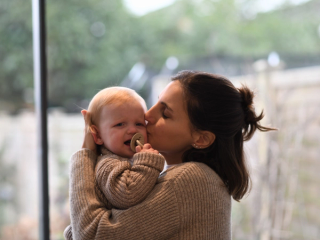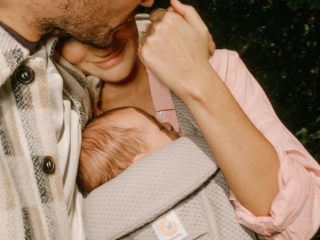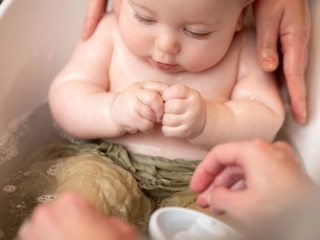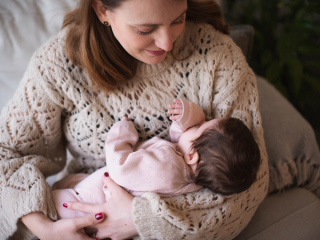
- Home
- Advice Hub
- Newborn
- New Parent Support
- Postnatal Nutrition & Foods For New Parents
Postnatal Nutrition & Foods For New Parents
Explore essential postnatal nutrition tips and nourishing foods to support new parents’ health and energy needs during early parenthood.
After welcoming your little one to the world, there are so many life changes and new things to think about that the nutritional balance of your diet probably isn’t a top priority. But eating well and staying hydrated can make a huge difference to how you feel – especially in those exhausting newborn days.
However, it is important to give the quantity and quality of the foods and drinks you’re consuming some thought to ensure you are receiving all the energy and nutrients you need to produce milk for your baby, and to optimise your own health. Whether or not you are breastfeeding, a well-balanced, healthy diet should help you feel more energised and less tired, preparing you well for the busy days ahead.
Why should you be eating healthy foods?
At every stage of your life, maintaining a balanced diet will help lift your energy levels and ensure you have the nutrients you need for a strong immune system. Postpartum, when your system is trying to catch up with itself after pregnancy and childbirth, these nutrients are more important than ever. Food for new parents isn’t just about sustenance, but also about giving you the resources to cope with the days and nights ahead of you.
If you’re breastfeeding, you’re burning more calories than usual and losing fluids at a more rapid rate. For breastfeeding mums, it’s even more important to eat a balanced healthy diet to help support milk production.
What does a healthy balanced diet look like for new parents?
When we talk about trying to maintain a healthy balanced diet, we’re absolutely not talking about dieting. As a new mum recovering from pregnancy and birth and not getting nearly enough sleep, this is not the time for dieting. We’re talking about getting a good range of vitamins and minerals and food groups so that you feel energised.
As a quick recap, a balanced healthy diet consists of the following:
Fruits and vegetables – aim for at least five portions of fruit and veg a day, which can include fresh, frozen, tinned, dried or juiced.
Starchy foods should make up a third of overall food eaten. Aiming for wholegrain varieties will provide additional dietary fibre in your diet, which can really help if you have been affected by bowel issues or constipation after giving birth to your baby.
Proteins such as lean meat and chicken, fish, eggs, nuts, seeds, soya foods and pulses provide a diverse range of vitamins and minerals. Aim for at least two portions of fish every week – oily fish, such as salmon & mackerel contain omega 3 fatty acids, so include at least one portion of oily fish as part of your weekly fish intake.
Dairy & Alternatives such as milk, cheese, fromage frais and yoghurt contain calcium and other important nutrients. Choose lower fat and lower sugar options.
Healthy fats - Choose unsaturated oils such as rapeseed or olive oil, and spreads made from these, and consume in small amounts.
Stay hydrated - As always, make sure you’re drinking enough fluids, especially if you’re breastfeeding. Always keep a drink handy; water and skimmed or semi-skimmed milk are all good choices.
Foods to limit and avoid - For advice on what is ‘off limit’ for breastfeeding mums, including some fish and caffeine-containing drinks and foods, have a look at which foods to be aware of HERE.
Feel good foods
You may be wondering if there are any ‘feel good foods’ that can give you an extra boost!
Whilst a healthy balanced diet should enable you to meet the majority of your nutritional needs; bar vitamin D (for which there are few dietary sources), the requirement for additional nutrients is very individual, and would be discussed with you by your healthcare professional. So if you do have any concerns, please speak to your GP, pharmacist, or other healthcare professional.
You’ll get small amounts of vitamin D from egg yolks, oily fish, and fortified foods such as breakfast cereals, but most of it is created by your body from the direct sunlight on our skin.
However, as sunlight is often quite lacking in the UK, recommendations are that everyone, including pregnant and breastfeeding women should consider taking a daily supplement containing 10mcg of vitamin D, especially during autumn and winter.
Vitamin D, amongst other things is well known for its importance in maintaining a normal immune system functioning.
Particularly for new mums, whose iron status may be a bit compromised following birth, it’s a good idea to pay particular attention to the amount of iron rich foods in your diet.
Iron-rich foods include red meat (opt for leaner and unprocessed options), beans, dried fruit such as apricots, and fortified breakfast cereals. Within a healthy balanced diet, aim to consume iron rich foods alongside foods rich in vitamin C, like oranges, strawberries, tomatoes and red peppers to help you absorb it.
Each mum will be different. While breastfeeding does require energy, the amount depends on how much you’re breastfeeding and for how long. Exclusive breastfeeding in the first 6 months may increase your energy requirements (in a healthy way!) by up to an extra 300 calories per day, but if you are combination feeding, this will be less.
If you’re feeling tired from a poor night’s sleep, try to resist the urge to grab quick-fix snacks like biscuits, chocolate, cakes, pastries, or crisps. These foods can be high in fat, sugar and/or salt, with relatively little other nutritional content. Try to have healthier snacks instead, with greater nutritional benefit, such as:
- Fresh fruit
- Fruit yogurt or plain yogurt sweetened with fruit
- Wholewheat crackers/crispbreads/oatcakes and reduced fat cheese
- Rice cakes with peanut butter
- Small wholemeal pitta/wrap, breadsticks or carrots/red pepper/cucumber batons with houmous
- Smoothies – made with plain yogurt/milk, banana and frozen berries (maximum of 150ml of smoothie a day)
- Plain nuts and seeds (without added salt)
If you love baking, look out for nutritious recipes you can bake and freeze, so you’ve always got tasty treats to hand.
Food Ideas for New Parents
If you’re worried about finding time to eat healthily whilst settling into looking after your new baby, don’t be, it doesn’t have to complicated! Here are some quick and easy healthy meal ideas to help maintain good postpartum nutrition:
Breakfast – Breakfast is a great opportunity to get fibre into your system. Wholegrain cereals, porridge and wholemeal toast are all good sources of fibre. Add fruit, nuts or nut butter and seeds to really set yourself up for the day.
Lunch –Low-fat cheese or a tinned salmon sandwich with wholegrain bread, baked beans on toast or in a baked potato, hummus with wholemeal pitta bread and vegetable sticks – the options for a healthy, hearty lunch are many and varied! Go for wholemeal bread, pasta and rice, and try to get some veg in there if you can.
Dinner – Any dinner options that include a range of protein, wholegrain starch and vegetables, are a winner. For example, wholegrain pasta with bolognese, vegetable lasagne, stir fry, curry, etc.
Snacks – Fresh fruit with low fat yoghurt, nuts (the low-salt kind), hummus and breadsticks, homemade trail mix (nuts, seeds, dried fruit)
And here’s some top tips for those early weeks and months:
- Choose things you can eat with one hand, as it’s almost guaranteed the baby will want to eat when you do!
- If a dish is ‘freezable’, try cooking more than you need and freeze the extra portions for another day.
- When friends and family are keen to help, take up their offer of a healthy home-cooked dinner once in a while.
- If you do find yourself struggling to put together nutritious meals, try subscribing to a recipe box service like HelloFresh or Gousto, or pick up a range of COOK ready meals, which can be cooked from frozen without any effort on your part. COOK even offer a ‘New mum’s survival box’, which includes 10 single portions of dinner or lunch.
Food recipes for new parents
We love a one-pot meal for ease (and less washing up!). Vegetable chilli gets loads of veg into a hearty, warming meal that is easy to eat one-handed. Try this recipe from The Mother Cooker. The addition of sweet potatoes and lentils makes this vegan chilli a good source of beta carotene, vitamin C, potassium and protein. If you want rice with it, go for brown – which is a good source of dietary fibre and as a complex carbohydrate will help fill you up for longer.
Cottage pie (or shepherd’s pie, depending whether you’ve got beef or lamb in the fridge) is a classic comfort food. This is another meal you can eat one-handed – ideal if your baby is coming to the table with you. It’s a little bit more work than the veggie chilli, but who could say no to cheesy mash potatoes? Try this recipe from BBC Good Food, which is packed with veggies alongside lean beef.
Frittata is a flexible option, ideal for using up leftovers or packing lots of veg into a one-pot dish that requires very little effort. This recipe from The Stay At Home Chef gives you the flexibility to adapt to whatever you’ve got in your fridge. All you need is a good skillet and plenty of eggs. Plus, any leftover frittata can be stored in the fridge for up to 4 days and used for a hearty breakfast, lunch, tea or just for a snack. Super flexible food.
Food and drink to be aware of
Caffeine and alcohol - Caffeine can reach your baby through your breast milk and may keep them awake, so it’s a good idea to restrict your caffeine intake to less than 200mg a day when breastfeeding. Things to keep an eye on beside coffee are tea, chocolate, energy drinks and soft drinks, as well as some cold and flu remedies. If you’re going to drink alcohol while breastfeeding, try to limit to one or two units a week, and allow a couple of hours between drinking and breastfeeding.
Peanuts and other allergens – Peanuts or foods containing peanuts, such as peanut butter, can be included as part of a healthy, varied diet while breastfeeding – unless you’re allergic! Avoiding peanuts or other allergenic foods (for example eggs or wheat) while breastfeeding won’t reduce your baby’s chances of developing an allergy and is not recommended.
However, if you have a family history of food allergies or other allergic conditions, then your baby may be at higher risk of developing an allergy, and you may wish to discuss this further with your GP, midwife or health visitor.












